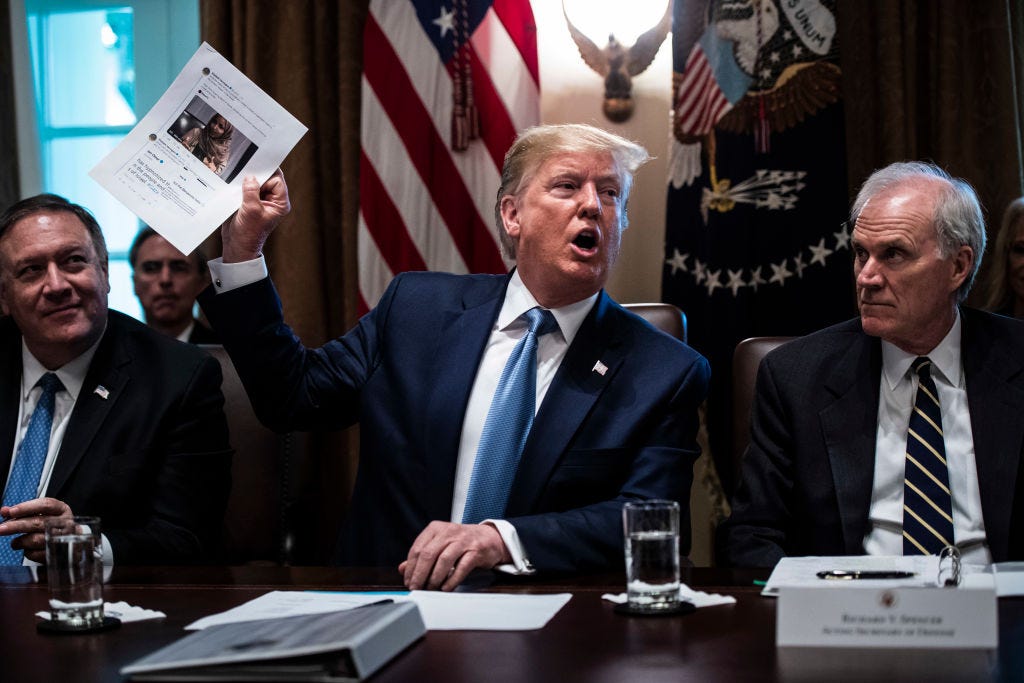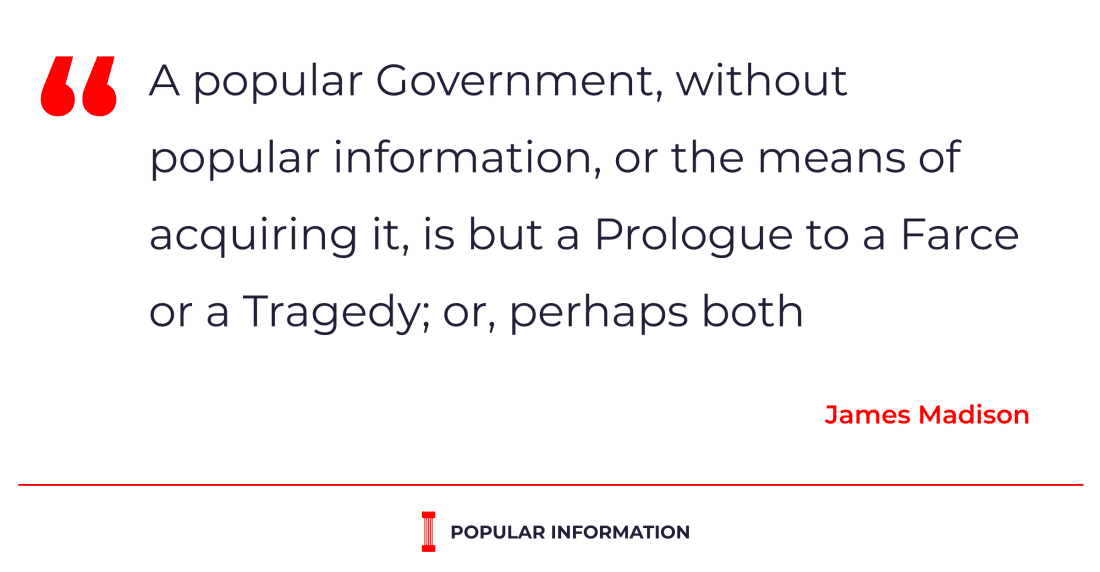 |
Photo by Jabin Botsford/The Washington Post via Getty Images
Facebook and Twitter both issued clear policies: Publishing misinformation about voting methods in advance of the 2020 election is prohibited. But the companies have decided not to enforce these policies against Trump.
Twitter's policy, which was announced in April 2019, states that the service may not be used "for the purpose of manipulating or interfering in elections," which includes "posting or sharing content that may suppress voter turnout or mislead people about when, where, or how to vote." Specifically, Twitter prohibits "misleading claims about voting procedures or techniques which could dissuade voters from participating in an election."
Facebook's policy, which has been in place since the 2018 midterms, similarly prohibits "voter suppression and intimidation," including "misrepresentation of the dates, locations, times and methods for voting." CEO Mark Zuckerberg made clear that, unlike Facebook's policy for false information in ads, there was no exception for political candidates.
On Wednesday, Trump published two posts to both platforms that appeared to violate these rules. First, Trump posted on Facebook and Twitter that Michigan was "illegally" sending 7.7 million people absentee ballots:
Breaking: Michigan sends absentee ballots to 7.7 million people ahead of Primaries and the General Election. This was done illegally and without authorization by a rogue Secretary of State. I will ask to hold up funding to Michigan if they want to go down this Voter Fraud path!
Trump's claim was false. Michigan is not sending absentee ballots to 7.7 million people. It is sending absentee ballot applications. Describing an absentee ballot application as a ballot is a misrepresentation that could suppress voting. Moreover, there is nothing "illegal" about sending someone an absentee ballot application. Telling someone that an absentee ballot application they receive was sent to them "illegally" could dissuade them from voting.
Then, Trump posted on Facebook and Twitter that Nevada sent "illegal vote by mail ballots."
State of Nevada “thinks” that they can send out illegal vote by mail ballots, creating a great Voter Fraud scenario for the State and the U.S. They can’t! If they do, “I think” I can hold up funds to the State. Sorry, but you must not cheat in elections.
Nevada's Secretary of State is sending absentee ballots to voters. But there is nothing illegal about it. Asserting, falsely, that an absentee ballot is "illegal" could dissuade people from voting. This is a particular problem in Nevada, where the state plans to severely limit in-person voting.
On Wednesday afternoon, Trump deleted his original posts about Michigan. He replaced it with two posts that were nearly identical to the originals, but added the word "application," fixing one of his two errors. The revised posts are still factually inaccurate and could dissuade people from voting by telling them their absentee ballot applications are illegal.
But Trump did delete the original posts. Was this a result of Twitter or Facebook enforcing its policies?
With respect to Twitter, no. A Twitter spokesperson told Popular Information that Trump's tweets "are not currently in violation of the Twitter Rules." The spokesperson also confirmed that no "enforcement action" was taken against the original Trump tweet about Michigan.
The Twitter spokesperson said the tweets did not violate its rules because Trump did not directly dissuade people from voting. But this is a standard that is much narrower than Twitter's stated policy, which prohibits "misleading claims" that "could dissuade people from voting." It does not only prohibit directly telling people not to vote. Twitter did not respond to a follow-up question regarding the discrepancy.
A Facebook spokesperson declined to comment, and the company took no action.
Vanita Gupta, president of The Leadership Conference on Civil and Human Rights, told Popular Information that Trump's posts violated the policies of both companies and sharply criticized their failure to act. Gupta, the leader of one of the largest civil rights organizations in the country, helped write Facebook's policy.
Gupta said that, with respect to the Michigan post, even after the correction, Trump is "using the highest office to propagate a lie that the absentee ballot application being sent to every home is illegal." Gupta said Trump's post creates "fear" and "confusion" for people filling it out, suppressing participation. Trump's Nevada post, Gupta added, violates the policies of both companies for the same reason.
The issue goes beyond two posts. Twitter and Facebook are empowering Trump to ignore rules designed to protect the integrity of the 2020 election. He is likely to make extensive use of that power over the next six months.
The plot unravels
Trump appears to believe that efforts to expand vote-by-mail are part of a Democratic plot to steal the 2020 election. Michigan's Secretary of State, Jocelyn Benson, is a Democrat. But Nevada's Secretary of State, Barbara Cegavske, is a Republican. In a statement, Cegavske noted that "a federal judge ruled" her decision to conduct the 2020 primary election by mail was a lawful exercise of "authority granted to her by state law." The push for mail-in voting is about keeping people safe from the coronavirus, not partisan politics. Democrats "have sued Ms. Cegavske to block her effort to close nearly all of the state’s in-person polling places" because some voters may be unable or unwilling to vote-by-mail.
Georgia decided "to send absentee ballot applications to nearly seven million voters, and on Wednesday the Republican secretary of state urged people to cast their votes by mail ahead of next month’s primary elections."
In Iowa, "Republican Secretary of State Paul Pate has… decided to send all registered voters an absentee ballot request form for the state's June primaries, saying "the safest way to vote will be by mail."
The Republican Secretary of State in Kentucky, Michael Adams, "has decided to send postcards to all registered voters explaining how they can sign up online to request an absentee ballot for June primaries." Adams says he hopes "90% of voters vote absentee so we can take the strain off our poll workers in our polling sites."
Fraudulent consensus
White House Press Secretary Kayleigh McEnany claimed there is "bipartisan consensus on the fact that mass mail-in voting can lead to fraud." There is a potential for fraud in any kind of voting. But mail-in voting fraud, like other types of voter fraud, is rare.
Law Professor Richard Hansen, an expert on voting, explained in a recent op-ed in the Washington Post:
According to the well-constructed News21 database, absentee-ballot ballot fraud made up 24.2 percent of all reported prosecutions of election crimes between 2000 and 2012. But the total number of cases was just 491 — during a period in which literally billions of votes were cast. While certain pockets of the country have seen their share of absentee-ballot scandals, problems are extremely rare in the five states that rely primarily on vote-by-mail, including the heavily Republican state of Utah.
Hansen concludes that "the COVID-19 pandemic has radically elevated the risk of gathering at polling stations, making mail-in balloting a crucial alternative." After an April 7 election, "at least 67 Wisconsin residents got COVID-19 after voting in person or working at the polls."
Thanks for reading!
You can support independent journalism that holds powerful corporations accountable by becoming a paid subscriber.
 |

